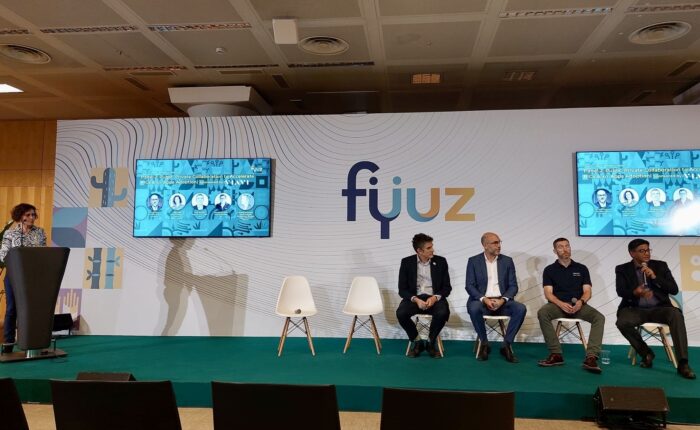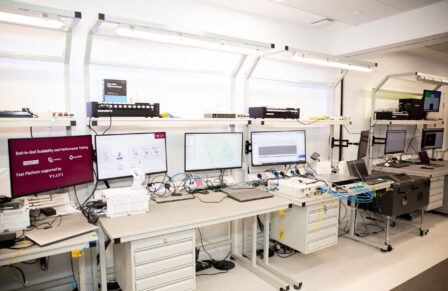Open RAN: Accelerating momentum for crossing the chasm into wider adoption – key learnings from Fyuz 2023
Posted 1 Nov 2023
Open RAN: Accelerating momentum for crossing the chasm into wider adoption – key learnings from Fyuz 2023
By Linda Ligios, Senior Innovation Partner and Team Lead at Digital Catapult
Fyuz, a conference held in Madrid and organised by the Telecom Infra Project (TIP) and O-RAN Alliance, is always a key date in the international telecom calendar for senior executives to converge and discuss the latest industry hot topics. This year’s event opened with an overall sense of optimism over progress in the Open RAN space, with industry coming together to recognise the value of disaggregated and new intelligent components, and celebrating the increase in trials and brown field deployments.
This growing momentum was echoed in the announcement of the first cluster of Shared Open RAN-based sites, with Samsung playing a key role in a successful pilot by Vodafone and Orange, based in a rural location in Romania. This was followed by the news of Vodafone’s partnership with Nokia to run a commercial 5G Open RAN pilot in northern Italy for the first time.
My top three takeaways from Fyuz
1. There was widespread recognition amongst speakers that technology developments and early adoption have been driven by the clear opportunity that Open RAN offers in advancing network automation and virtualisation.
Some of the biggest promises of Open RAN are driven by the RAN Intelligent Controller (RIC) and smarter chipsets, which are fast-tracking the development of innovative algorithms.
Although the journey towards virtualised and programmable networks has only just begun, it was promising to hear that testing sample quantities of new Intel chipsets will be available to smaller third-party vendors at Vodafone’s R&D lab in Malaga, to speed up the time to deliver innovation. This announcement came along with Vodafone reporting that 90% of individual KPIs are exceeding legacy technology and Open RAN is demonstrating a 30% reduction in Total Cost of Ownership (TCO).
This news reinforces our ambition at SONIC Labs; to unlock innovation in the Open RAN space by enabling smaller digital-first companies that have the technical expertise and transferable skills to develop new intelligent applications to optimise network performance.
Once again, the RIC took centre stage as one of the key components within Open RAN architecture carrying the innovation promise of automation, new services and opportunities for network monetisation. These developments were discussed further in the breakout session I moderated with panellists Chris Murphy (VIAVI Solutions), Arnaud Polster (Accelleran), Michael McGroarty (VMware) and Ramesh Sriraman (HCL Technologies), with a focus on public-private collaboration to accelerate RICs and x/r Apps adoption.
There was a general consensus that more needs to be done to reduce the barriers to entry for smaller players, and public funding can certainly play a big role in creating a level playing field. The panellists shared insights on recent developments from the ARI-5G project and recommendations for ARIANE, the TIP-led consortium, which with backing from Department of Science Innovation & Technology (DSIT), aims to enhance operator trust in RIC applications for RAN deployments, drive RIC and application development.
2. Artificial intelligence (AI) and its applicability to telecoms was also a hot topic throughout Fyuz.
There were mentions of plausible futures where the telecom evolution will go beyond self-organising and disappearing networks, but there were also more realistic views around the fact that AI is not the only answer and there are problems that do not necessarily need algorithms to be solved.
Although there are some AI-based models and solutions readily available, one of the challenges raised by industry experts remains around data availability and sharing for testing and new product development.
There was also a general consensus that more needs to be done to get investment from VC to support the entrance of the smallest players. Maybe we need to start using the word AI to make the prospect of innovation returns more attractive to investors?
3. There is eagerness for the technology adoption to cross the chasm but there are still challenges to be overcome including bridging the gap in conformance testing and mitigating national disparities for more consistent test results.
Some unanswered questions also fluttered around in the breakout sessions, with concerns around the ‘risk of single vendor Open RAN’ and ‘Open RAN starve’ if mobile network operators don’t get involved in large-scale deployments.
However, we certainly witnessed the willingness of the international labs, industry and policymakers to work together to simplify the vendors’ journey towards certification and it was quite timely to welcome the UK government announcement of a global coalition for telecoms innovation with countries including Australia, Canada, Japan, and the United States of America.
It was cheering to see momentum gathering in the international space and SONIC Labs will be working closely with the Open RAN ecosystem to continue to accelerate the adoption journey.
Interested in joining the SONIC Labs programme?
Find out more about SONIC Labs and sign up for the latest updates by visiting here.


Digital Catapult newsletter
Receive articles and insights like this delivered directly to your inbox
Subscribe now





